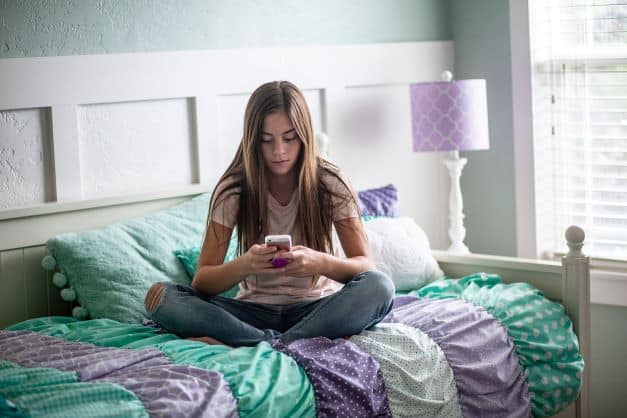
In this post: It’s hard for teens to resist the pull of their phones, especially when they’re bored at home. But parents need to take control by setting boundaries and making sure their kids understand why they should put down their devices.
Parents Need to Remember That Kids Did Not Grow Up the Way We Did
My family was vacationing with some good friends whose kids are just a few years behind my three teenagers.
One day, I noticed them watching my daughters, one who was reading a book, another listening to a podcast, and the third juggling a soccer ball.
“Your kids haven’t been on their phones much this trip,” he commented. “What’s your secret? How do you get your teenager off their phone?”
And I laughed because there were no secrets, “It wasn’t easy. The approach is simple, though. I had to show them that there were things worth doing that weren’t on their phones–even when I didn’t feel like it.”
And my friend countered: “But don’t you remember how we never had to be told how to fill our time? We just did it.”
He wasn’t wrong. I remember growing up in the 80s when I would play outside for hours. I would climb trees and build forts during the day. In the evenings, we’d watch whatever my dad wanted on television for an hour or two. Then, it was off to bed, where I would read until my mom would yell at me to turn off my light, which is when I would sneak into my closet or read underneath my covers with a flashlight.
But we often forget that we weren’t raised the way we’ve raised our kids, simply because the technology wasn’t available.
I replied: “Yeah, but we didn’t grow up with iPads on car trips and every toy lighting up and a phone to play with at every juncture. There were no on-demand movies or portable video games.”
You have to accept it. Technology has changed the world as we know it, for good and bad. I know how hard it is for me to put my phone down, and I remember a time without them.
My kids don’t.
We Can’t Just Tell Our Kids to Put Down Their Phones. We Have to Show Them How to Fill Their Time
You see, when my kids were babies, I would watch when my mom would get down on the floor with them and play. I wasn’t into it and always wanted them to occupy themselves for a few minutes, so I could do dishes or pick up a few things.
She would show them how to stack blocks and how dolls could have tea parties and how a box could become an airplane.
These were tricks that worked when she was a nursery school teacher many years ago, and she explained how kids sometimes need to be taught how to use their imagination and learn to play.
“It takes time, but it will pay off later when they can entertain themselves,” my mom told me.
And she was right. Eventually, my kids did learn to play by themselves more, and I was so appreciative my mom showed me how to do that.
Teens Today Are Struggling with Their Phones and Don’t Know What to Do
About 18 months ago, I realized my kids were in a bad place with their phones from the pandemic. I’m not sure if I would say that my teens were addicted to their cell phones, but they definitely didn’t know how to fill their time without them.
I often found them in their rooms mindlessly scrolling or watching videos for hours. When I asked them to put their phones down, they usually would, but only to roam around our house moody and sullen until I found them back up on their beds an hour later.
All three seemed more anxious and snappy with their responses to basic questions. Their motivation to do anything vanished. It was frustrating that the second they walked through the door, they would saunter up to their rooms only to slump on their bed to start scrolling.
We all know that cell phones and social media are hurting our kids’ mental health. It’s no surprise that after the pandemic, we are immersed in a teen mental health crisis.
But knowing what to do about it is tough when everything seems connected to their phone. And who wants to have that fight all the time?
Something had to change. It was time to figure out how to get my teenager off their devices.
This Is How I Got My Kids to Put Down Their Phones
I had to teach them things to do without their phones.
So, instead of simply telling them to put their devices down, I would say things like:
- “Hey, let’s go thrifting.”
- “I looked up a new trail to hike.”
- “Let’s try to make those new cookies, but we have to go grocery shopping first.”
- “Let’s watch an episode of that show you like.”
- “Do you want to go to the bookstore with me?”
- “Sure, I’ll drive you and your friend to X.”
Anytime they expressed an interest in something that didn’t have to do with their phone, I tried to pounce on it.
When my daughter said she wished she didn’t quit piano, I dug our old keyboard out and showed her an app where she could learn her favorite songs. My other daughter said she would love to hear more live music, so I tried to find every opportunity to take her to some free concerts. When another said she needed volunteer hours, we did a few opportunities together.
I was okay with them using their phone with a constructive app. We tried yoga on a fitness app, sometimes they would listen to podcasts while putting their clothes away, and we started playing audiobooks in the car.
The goal was to get them to be cognizant when using their phones. I wanted them to stop using them to fill time gaps because they were bored–or to avoid doing something they needed to complete.
Your Teen Will Never Thank You When You Set Boundaries About Their Phone Usage
Don’t kid yourself. My three teenagers did not welcome these opportunities with open arms and phrases like, “Oh, mom, you are the best! Thank you so much for limiting my screen time!”
It was exhausting for me to work full time and try to fill their phone void. I had to sacrifice much of my free time and the things I wanted to do for myself. It was tough to be creative with ideas without spending a lot of money. There were many times I had to do things that I don’t enjoy (like watching an entire season of Outer Banks.)
I had to endure a lot — A LOT — of eye rolls and sighs and how they could turn the word “mom” into three syllables.
But I kept at it.
Be clear about expectations and what you are willing to do to fill the void.
When Starbucks had half-off days, I took them there. If they mentioned a local place they wanted to visit, I scheduled the time to do it. I even baked a cake at 10:30 p.m. after a long day of work. The next day I was exhausted, but it was worth it.
And excruciatingly slowly, I noticed a change.
Once you figure out how to get your teenager off their phone, they start figuring it out, too. One day, my daughter asked if she could get some books from the library, so I dropped her off while I ran an errand. She plowed through an entire series in a week. I tried not to make it a big deal (although I was so happy I could have cried.) Then, my husband watched the movie series and a few similar ones with her.
A few days later, two of my daughters and their friends went to watch the sunset with a picnic for a few hours at a local park while the other had some friends over for S’mores. The only time I saw the phones out was to take some photos.
They Are Now Starting to Fill Their Voids in Healthy Ways.
Don’t get me wrong. They spend PLENTY of time on their phones still, but when I talk to them about it, they’ve made progress.
At the beginning of the summer, my almost 18-year-old surprised me by stating she didn’t want to keep her phone in her room at night because she found it too distracting. My other daughter said she took Instagram off her phone “for now” because she didn’t like how it made her feel. All three have drastically reduced their weekly screen time.
And now, when they have a bad day, or I can tell something is wrong, I don’t see them rushing into their bedrooms and sitting on their phones all night. I see them going for a jog, taking the dog for a walk, or sometimes even journaling.
Knowing How to Control Your Technology Use Is an Important Life Skill
I believe they can now make these healthy choices because they no longer feel tethered to their phones. They no longer use them to soothe their minds or hearts.
Here’s the thing: We can complain about technology, phones, and social media. We can focus on how different things were when we were growing up. We can try to put all the monitoring software and screen time limitations we want on their devices.
OR we can do something about it. We can teach them how to live life differently, in a more healthy way.
I’m not saying it’s easy. But I am saying they are worth it.
P.S. Are you looking to have a better relationship with your teen? We love this book, Parenting Teens with Love and Logic: Preparing Adolescents for Responsible Adulthood, by Jim Fay.

Are you in the thick of raising your tweens and teens? You may like this book by Whitney Fleming, the co-owner of Parenting Teens & Tweens: Loving Hard When They’re Hard to Love: Essays about Raising Teens in Today’s Complex, Chaotic World.

*This post contains affiliate links where we may earn commissions for items purchased from links on our site.





Great ideas! Could you send along alternatives for teen boys? Some of your suggestions for your girls, my boys won’t be into. Thank you for the advice and the honesty that it won’t be easy!